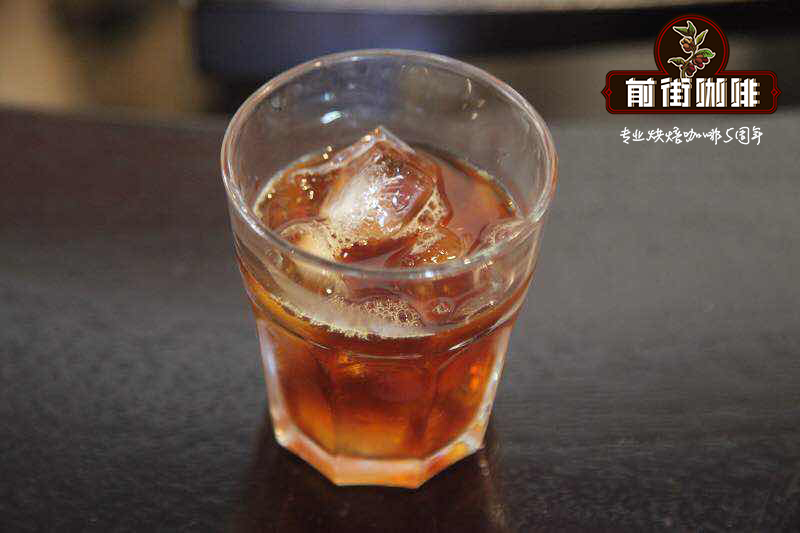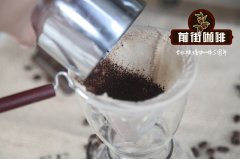Japanese iced coffee making Daquan! What is the difference in the way Starbucks coffee is made?

Professional coffee knowledge exchange more coffee bean information please follow the coffee workshop (Wechat official account cafe_style)
If you are tired of cold coffee, don't worry, you are not alone, there are many people want to try a new coffee ice drink, maybe Japanese iced coffee is your best choice!
Many people think that if you soak the coffee powder in ice water overnight, the coffee will become insipid. Using a professional curling kettle may be able to extract more flavor, but the process is time-consuming and labor-consuming, and the purchase of equipment is not a small expense.
But fortunately, there is a convenient, efficient and effective way to extract all the flavors of coffee: Japanese iced coffee!
What is Japanese iced coffee?
The method of making Japanese iced coffee is very simple, first put ice cubes in the coffee cup, and then use the common method to brew the coffee in hot water.
Soaking coffee such as cold extract usually takes 6-12 hours to make, while Japanese iced coffee uses hot water to stimulate all the taste and aroma of the coffee in a short time, shortening the production time and helping you retain the rich and charming taste of the coffee. Coffee cools quickly after touching ice cubes, effectively locking the aroma in the coffee.
Isn't it amazing that the Japanese iced coffee made in this way has a rich taste and takes exactly the same time as ordinary coffee?
In today's article, we will explore several common ways to make Japanese iced coffee at home. To this end, we interviewed more than 150 coffee professionals from around the world and listened to their advice on the production of iced coffee.
We will comprehensively discuss the advantages, disadvantages, brewing suggestions, brewing formula and recommended types of Japanese iced coffee.
1. Advantages of Japanese iced coffee
Make it quickly
"Japanese iced coffee is made very quickly, and if you suddenly want to drink iced coffee, you don't have to wait all night or even all day." David Inden, Seattle, USA
Bright taste and rich taste
"if made accurately, Japanese iced coffee is extremely rich in taste and bright in taste. We have tried to make it with water-washed Yega cigar, which tastes better than any cold-extracted coffee of the same type. " -- Jonathan Pascual,Taproom Coffee & Beer, Atlanta, USA
No need for professional equipment
Whether it's an Philharmonic pressure or a filter coffee machine, you can use any coffee equipment at home to brew it. The only difference is to add ice to the coffee cup in advance.
two。 The defects of Japanese iced coffee
Can only make one drink at a time.
"compared with cold coffee, which can make a whole pot at a time, Japanese iced coffee can only be made one cup at a time, and it may be troublesome to serve multiple people at the same time." -- Victor H.
It is not easy to achieve the ideal concentration.
"you have to take the melting of ice into account, so you need to adjust the degree of grinding, water and other variables, otherwise it will affect the aroma and taste of the coffee." Chad, Portland, USA
3. Brewing suggestion
You can use any existing brewing equipment to make Japanese iced coffee without spending money on professional equipment, or even retain the original brewing formula with few changes.
Therefore, there are a variety of methods and tricks for making Japanese iced coffee, but generally speaking, the following principles should be followed in making Japanese iced coffee:
Grind the coffee powder finely
"in principle, the coffee you make will be diluted by ice, so when making Japanese iced coffee, the amount of water should be 2 to 3 of that of regular coffee, so you need to grind the coffee powder a little bit and increase the contact area between the coffee powder and water so that more soluble substances can be dissolved in water." Tito Pena,The Wydown Coffee Bar, Washington, USA
Use chunks of ice to slow down the dilution rate
"the ice should be as large as possible, so that the melting rate of the ice will be slower and the rate of dilution will slow down." -- Lee Sill,Quills Coffee, Louisville, USA
The gouache ratio is lower (the gouache content is more).
When making Japanese iced coffee, the gouache ratio should be around 1:10, because the ice will dilute the taste of the coffee after melting. " Dustin Thomas,Steadfast Coffee, Nashville, USA
IMG_1936
4. Brewing formula
Philharmonic pressed Japanese iced coffee
Method: inverted type
Powder content: 19.8g
Degree of grinding:
Medium (3.5 degrees by hand mill)
Water quantity: 228g
Ice: 167g
Gouache ratio: 20:1
Brewing time: 2 minutes 6 seconds
Production method:
Insert the piston into the middle of Shanghai and Shenzhen until the "4" scale, turn it upside down and open up.
Pour in the coffee powder, then pour in 25g hot water, fully soak the coffee powder, stir slightly, and prebrew for 30 seconds.
Pour all the hot water into
Add filter paper to the filter of the lid, soak it, and then cover the lid.
Soak for 1 minute and 45 seconds
While soaking, add 167g ice cubes to the coffee cup
After soaking, turn the coffee pot upside down on the coffee cup and press it down for 20-30 seconds.
Chemex hand-made Japanese iced coffee
Powder content: 40g
Degree of grinding:
Medium (4.5 degrees by hand mill)
Water quantity: 422g
Ice cubes: 239g
Gouache ratio: 17:1
Production method:
Wet the filter paper and coffee pot with hot water and pour out the waste water
Add 239g ice to the bottom of the pot
Pour the coffee powder into the filter paper, then pour in 30-40g hot water and soak all the coffee powder.
Pre-brewing for 30 seconds
Pour 250g hot water in a ring, then drip for 20-30 seconds
Pour into the remaining hot water, also in a ring, the total time should be 3 minutes 45 seconds.
Hario V60 hand-made Japanese iced coffee
Powder content: 22g
Degree of grinding:
Medium (3.5 degrees by hand mill)
Water volume: 205g
Ice cubes: 187g
Gouache ratio: 18:1
Production method:
Wet the filter paper and bowl with hot water and pour out the waste water
Add 187g ice cubes to the coffee cup
Pour the coffee powder into the filter bowl, then pour in 20-25g hot water, soak the coffee powder thoroughly, and soak for 30 seconds.
Pour 100g hot water in a ring, then drip for 20 seconds
Pour in the remaining hot water until all the dripping is complete.
5. The recommended type of coffee
Any kind of coffee is fine.
"you can use any variety of coffee, especially high-end boutique coffee. I personally recommend light roasted coffee." Tito Pena,The Wydown Coffee Bar, Washington, USA
Washed Ethiopian coffee
"what we use most in the shop is washed Ethiopian coffee, which can fully reflect the aroma of flowers and citrus." -- Jonathan Pascual,Taproom Coffee & Beer, Atlanta, USA
Kenyan coffee
"I personally recommend Kenyan coffee because it highlights the citric taste of coffee and the sweetness of plums. In addition, tanning or washing Ethiopian coffee is also a good choice. To tell you the truth, I have never met a type of coffee that is not suitable for making Japanese iced coffee! " -- Jarboe,Palace Coffee Co
Author: handground.com
Important Notice :
前街咖啡 FrontStreet Coffee has moved to new addredd:
FrontStreet Coffee Address: 315,Donghua East Road,GuangZhou
Tel:020 38364473
- Prev

How do you make coffee in a coffee shop? How do you make a nice and delicious iced latte?
Professional coffee knowledge exchange more coffee bean information Please pay attention to the coffee workshop (Wechat official account cafe_style) Coffee shops are really everywhere, but it feels like more and more dominant atmosphere, the drink is actually not very qualified, iced coffee latte should be the basic model, how to make a good latte? You can make a high-priced latte with a bunch of atmosphere stores at home.
- Next

Coffee making flowchart from seed to cup Coffee production process classification
Professional coffee knowledge exchange more coffee bean information please follow the coffee workshop (Wechat official account cafe_style) coffee bean production modulation method there are two methods of coffee bean modulation: drying method and washing method. The drying method is the most primitive method, which is harvested immediately after the fruit is ripe, laid on a flat open space, and swept with a rake several times a day, so that the coffee beans can be dried.
Related
- Beginners will see the "Coffee pull flower" guide!
- What is the difference between ice blog purified milk and ordinary milk coffee?
- Why is the Philippines the largest producer of crops in Liberia?
- For coffee extraction, should the fine powder be retained?
- How does extracted espresso fill pressed powder? How much strength does it take to press the powder?
- How to make jasmine cold extract coffee? Is the jasmine + latte good?
- Will this little toy really make the coffee taste better? How does Lily Drip affect coffee extraction?
- Will the action of slapping the filter cup also affect coffee extraction?
- What's the difference between powder-to-water ratio and powder-to-liquid ratio?
- What is the Ethiopian local species? What does it have to do with Heirloom native species?

